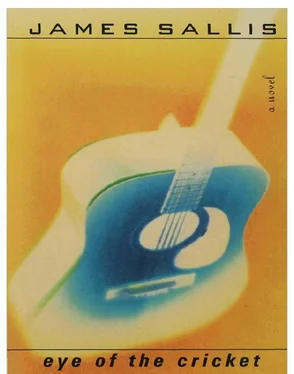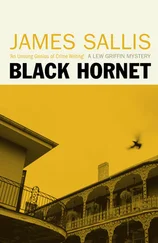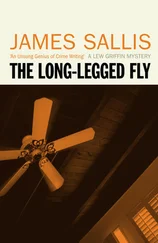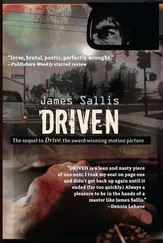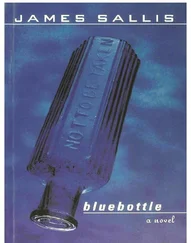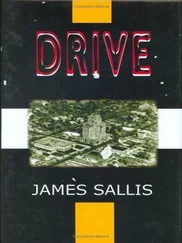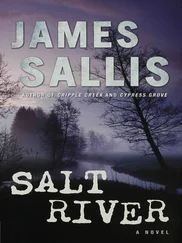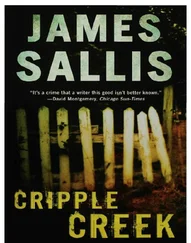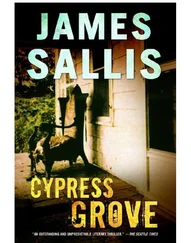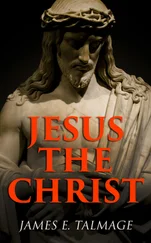James Sallis - Eye of the Cricket
Здесь есть возможность читать онлайн «James Sallis - Eye of the Cricket» весь текст электронной книги совершенно бесплатно (целиком полную версию без сокращений). В некоторых случаях можно слушать аудио, скачать через торрент в формате fb2 и присутствует краткое содержание. Жанр: Криминальный детектив, на английском языке. Описание произведения, (предисловие) а так же отзывы посетителей доступны на портале библиотеки ЛибКат.
- Название:Eye of the Cricket
- Автор:
- Жанр:
- Год:неизвестен
- ISBN:нет данных
- Рейтинг книги:3 / 5. Голосов: 1
-
Избранное:Добавить в избранное
- Отзывы:
-
Ваша оценка:
- 60
- 1
- 2
- 3
- 4
- 5
Eye of the Cricket: краткое содержание, описание и аннотация
Предлагаем к чтению аннотацию, описание, краткое содержание или предисловие (зависит от того, что написал сам автор книги «Eye of the Cricket»). Если вы не нашли необходимую информацию о книге — напишите в комментариях, мы постараемся отыскать её.
Eye of the Cricket — читать онлайн бесплатно полную книгу (весь текст) целиком
Ниже представлен текст книги, разбитый по страницам. Система сохранения места последней прочитанной страницы, позволяет с удобством читать онлайн бесплатно книгу «Eye of the Cricket», без необходимости каждый раз заново искать на чём Вы остановились. Поставьте закладку, и сможете в любой момент перейти на страницу, на которой закончили чтение.
Интервал:
Закладка:
"My book. One of them," the accident victim, the man I'd first thought to be David, Lew Griffin2, had said.
And what he'd done in this notebook I'd left him (I realized upon reading several pages) was recast The Old Man in diary form. The central situation, individual scenes, settings, dialogue: all were there. But so were elements that had nothing to do with my story-scenes and language that never belonged to it, never belonged in it, never would.
The notebook's unnamed, transparent diarist lives on the streets, moving freely through the city, watching people come and go and afterwards, in an attempt to understand them, making up stories about them: who they may be, how they pass their days or nights, what's important to them and what scorned, memories, dreams.
One day on Magazine he watches two men, thefirst older, white, the other a young black, leave a bar together, shake hands and strike out their separate ways. He thinks how very much, for all their visible differences, the two men resemble one another, self and shadow. And from that moment of unpresuming observation, the story-the notebook's remaining pages, its retelling of my novel-gains force and spins itself out.
When, years later, I met the younger man's son, it was with mutual, quiet recognition. You're David, I said.
Yes.
16
The past is no insubstantial, thready thing, sunlight slanting through shutters into cool rooms, pools and standards of mist adrift at roadside, memories that flutter from our hands the instant we open them. Rather is it all too substantial, bluntly physical, like a boulder or cement block growing ever denser, ever larger, there behind us, displacing and pushing us forward.
And yes: in its mindless, rocklike, solid, unstoppable way, it pursues us.
Once, I'd begun a short story comprised of a series of footnotes to another, undivulged text, footnotes that were to form among themselves a coherent, though discrete, text.
Another time I planned a novel each chapter of which would end midsentence, the next chapter scooping up the rest for its own beginning. Each chapter also was to be in some way-thematically, symbolically, parodically-a mirror image of the one before.
"Footnotes" meant to express the way I think we live, our days and actions little more than second thoughts, improvisations, elaborations, trills, upon some unperceived, unseen, probably imaginary text.
Going On, by contrast, was my fumbled attempt to insist upon an underlying unity, to imply connection among these disparate moments, to conjure up linearity.
That both stoiy and novel were abandoned cannot mean nothing.
If we must learn to put our distress signals in code, perhaps it's not because that way lies communication, perhaps it's only because the codes seem so much more meaningful, so much more fraught, than are our lives. Because we have somehow to imagine ourselves larger than the sun's footprint. And if we can't have meaning, then at least we'll have the appearance of meaning: its promise, heft, import.
I'd first come across that phrase, You must learn to put your distress signals in code, while browsing through literary magazines at Beaucoup Books on Magazine. I bought the magazine and carried it off to Joe's (not Joe's from the Quarter but a later, uptown incarnation that soon folded), where, drinking my way into evening, I read the rest of the magazine yet managed to arrive home without it. Years later I'd been in the audience when the poet David Lunde came to UNO to read.
— Some of the things Deborah O'Neil and I talked about after her play on Sunday. A kind of heady conversation I seldom had. Guiltily looking about as we sat in Rue de la Course (also on Magazine) over coffee, tea and biscotti, feeling again like the undergraduate I'd been for only the shortest of times.
Deborah's play was the surprise she'd promised.
She told me about it over dinner at Commander's, fine pate woody cabernet sauvignon, swordfish steak with bearnaise, grilled mushrooms, that amazing bread-pudding souffle they do.
We slid into seats front row center moments before the show began. The theater was a warehouse off Julia Street whose conversion seemed as superficial and tenuous as any Hollywood set. Behind pressed-fiber walls there would be echoing spaces of bare support beams, girders thick with cobweb and grime, uninhabitable spaces. The whole thing could be struck in a few hours. Seats were of the stackable plastic sort-contoured, they call them, though for what species I can't imagine. People sat in suits and dresses, in torn jeans, flannel shirts, all black, in designer warm-ups and overalls and not much at all, sipping white jug wine from plastic cups.
Onstage, characters at a dinner party swirled in eccentric orbits about one another. Obviously few were familiars; conversation was mostly phatic, with sudden intrusions of intensely personal remarks that brought silence crashing down. Domestic employees ferried through with platters of drinks, squab, canapes, tureens, covered dishes, but would not be detained.
All the actors wore masks, and the very moment we thought we had one of them pegged (manipulative CEO, poor-little-me wife, kindhearted friend) he or she would trade masks with one of the others and in so doing become a wholly different character.
Apparently there was also dissension among partygoers as to appropriate music. The sound track careened from Carl Orff to Willie Dixon to Sinatra to REM. At one point "Sympathy for the Devil" and the 1812 Overture played simultaneously.
Twenty minutes into the play (as I resisted impulses to pull out my notebook, start making lists, try to keep track of all this) one of the male actors left the stage and, stripping off everything but his mask, stepping into high heels and strapping on a tray like those cigarette vendors once wore, strode through the audience passing out still more masks. These were blank, but came with boxed crayons.
We were supposed to participate.
And some did, wonderfully.
The whole thing shimmered, changing again and again before our eyes-at once brilliant, prosaic, unheralded, obscene, chaotic, challenging, comforting, silly, obvious, disturbing.
A man in a three-piece gray suit and red smiley-face mask stood at the back of the hall and, claiming to be the play's author, confirming the disappointment he'd anticipated even from its inception, demanded that the production immediately be shut down.
Another, an emissary (he said) from the Arts Council in Washington, mask remaining blank, a form, praised free expression in America in drumlike manner.
One rose and, having brought a hush to the house with an imploring wave of his hand, wearing no mask at all, simply stood weeping.
Finally the cigarette vendor threw a kimono over substantial shoulders. Stepping back onstage, he said, "The rest is silence. Unless…"
He paused.
"… I have a higher bid?"
And the curtain fell.
To resounding applause.
My own not the least, once I'd shaken myself loose from the spell. Even to move, I felt, somehow would violate what I'd just experienced, bring mundane life crashing back in.
"Too pretentious, isn't it?" Deborah said beside me. "I knew it. I don't know why I let them-"
When I told her it was among the most powerful moments of theater I'd seen, she shut up and sat staring at me. All around us people stood, easing back into ordinary lives.
"You're desperate, Lewis."
Of course. But that was hardly new.
Still in his kimono, heels exchanged for platform slippers, the cigarette vendor came out with a dozen red roses for Deborah. She ducked her face into them.
"How embarrassing."
But couldn't escape standing to acknowledge the applause when it didn't stop.
When she did stand, swaying, I thought again, as I'd thought when I firstsaw her, of willows.
Читать дальшеИнтервал:
Закладка:
Похожие книги на «Eye of the Cricket»
Представляем Вашему вниманию похожие книги на «Eye of the Cricket» списком для выбора. Мы отобрали схожую по названию и смыслу литературу в надежде предоставить читателям больше вариантов отыскать новые, интересные, ещё непрочитанные произведения.
Обсуждение, отзывы о книге «Eye of the Cricket» и просто собственные мнения читателей. Оставьте ваши комментарии, напишите, что Вы думаете о произведении, его смысле или главных героях. Укажите что конкретно понравилось, а что нет, и почему Вы так считаете.
